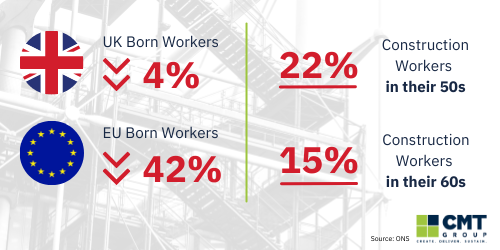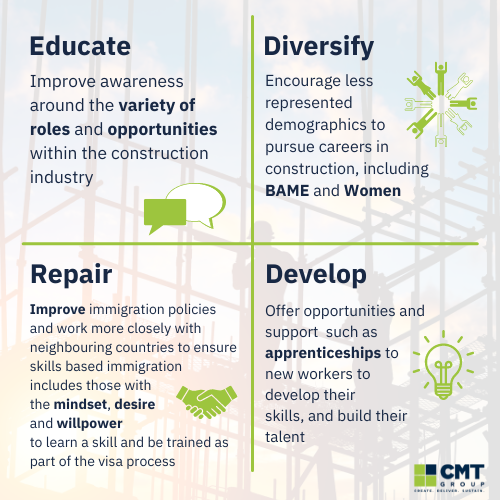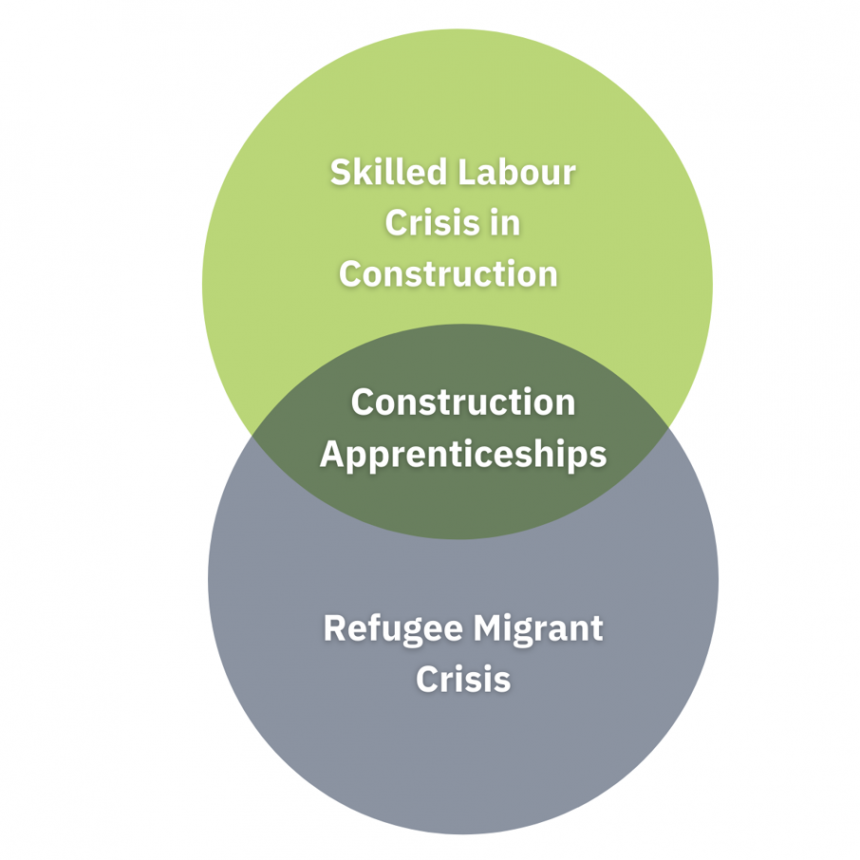Loading...
After a difficult two years, the skills shortage in the construction industry is at its highest since 2007. With the industry bringing in almost £100billion GDP each year, the knock-on effects of the shortage are sure to be felt for a while going into the future, but why is it happening and how can it be solved?

 A solution to the skills shortage that starts right at the source is to educate young people about the variety of roles that can be pursued in the construction industry. Better informing potential new recruits about what the industry has to offer them will see more people take these career pathways.
Encouraging diversification of the workforce will also play a valuable role in bringing more workers into the industry. Creating more openings and opportunities for BAME individuals and women will help to fill the gap and reduce the impacts of the skills shortage.
You can read our blog on the gender gap in the construction industry here.
For young workers in the industry, employers should provide as many opportunities as possible to develop their skills. Apprenticeship programmes and other support programmes are a great way to foster the development of needed skills and build talent to help eliminate the skills shortage.
A solution to the skills shortage that starts right at the source is to educate young people about the variety of roles that can be pursued in the construction industry. Better informing potential new recruits about what the industry has to offer them will see more people take these career pathways.
Encouraging diversification of the workforce will also play a valuable role in bringing more workers into the industry. Creating more openings and opportunities for BAME individuals and women will help to fill the gap and reduce the impacts of the skills shortage.
You can read our blog on the gender gap in the construction industry here.
For young workers in the industry, employers should provide as many opportunities as possible to develop their skills. Apprenticeship programmes and other support programmes are a great way to foster the development of needed skills and build talent to help eliminate the skills shortage.
 Quick solutions are not easy to come by for issues like the labour skills shortage, but more needs to be done to resolve issues with migration to rebuild the migrant workforce. This is not only a technical one but also a relational one, with a rebuilding of trust necessary to encourage migrant workers from the EU to return to the UK.
Putting time and money into offering apprenticeship opportunities will not only help to rectify the skills shortage from home but will also reduce the impact of the migrant worker shortage too. Bringing more young people into the industry will reduce reliance on overseas workers whilst bridging the skills shortage gap.
Quick solutions are not easy to come by for issues like the labour skills shortage, but more needs to be done to resolve issues with migration to rebuild the migrant workforce. This is not only a technical one but also a relational one, with a rebuilding of trust necessary to encourage migrant workers from the EU to return to the UK.
Putting time and money into offering apprenticeship opportunities will not only help to rectify the skills shortage from home but will also reduce the impact of the migrant worker shortage too. Bringing more young people into the industry will reduce reliance on overseas workers whilst bridging the skills shortage gap.
Why is there a construction skills shortage?
When it comes to the shortage of skilled workers, one of the immediate causal issues is the lasting effect of both Brexit and the Coronavirus pandemic. Both of these events have had their impacts on the number of migrant workers in the UK as well as the number willing to return. For the last 20 years, the industry has relied heavily on migrant workers, mainly from the EU, to make up the workforce. In 2017, more than 17% of construction workers in the UK were non-UK born. Brexit brought the end of the free movement of labour. This barrier not necessarily eliminated the inflow of migrant workers, but was discouraging to possible incomers. Following Brexit, the impact of the pandemic and travel restrictions has put further pressure and limits on returning workers. The large number of migrant workers has for many years been a bandage to the lack of young people going into construction careers. Over the years, fewer young adults are pursuing training for skilled roles in construction. Whether due to poor education or a lack of appeal for reasons like pay, the low number of young people entering into the construction industry means the industry is struggling to pass on vital skills to a new generation of workers. With this being previously mitigated by migrant workers, the issue is now more apparent and wounding than ever. Over a fifth of the construction workforce are in their 50s. These workers have spent long careers building the knowledge that marks them as the skilled and valuable assets to the industry that they are, however, the next 10-20 years will see many of them retire. Over a short period of time, another significant portion of the industry's skilled workers will leave work and further expand the skills gap, with an insufficient number of new workers entering the industry to compensate. With the old leaving the industry and few newcomers and returning migrant workers, the already hard-hitting skills shortage is not set to resolve any time soon. The construction industry in the UK still has as many as 166,600 workers still on furlough, despite construction output returning to near pre-pandemic levels.
Impacts of the construction skill shortage
The labour shortage, whilst not a new issue, will present new challenges over the coming years. Of course, the most obvious dilemma the situation presents is that a lack of skilled workers will limit the delivery of important infrastructure projects. Housing targets are also likely to suffer. HS2 put together a strategy back in 2018 to ensure the acquisition of sufficient skilled labour to ensure the completion of the major project. This strategy was revised this summer to accommodate changes including those brought about by the coronavirus pandemic, however, the uncertainty surrounding the issue suggests there still could be difficulties ahead. Not only does the skill shortage put pressure on the successful completion of the project but it also sees the costs increase too. Many members of the public have already expressed concerns about the mounting cost of the HS2 project, and the skills shortage threatens to push the bill up higher. With labour availability tight, salaries are seeing a price hike. Those working in the industry with the right skills are in higher demand, allowing them to increase prices. The impact of this price hike and the general shortage is hardest felt by smaller companies, who are struggling to compete with larger firms to acquire skilled workers.How to tackle the skills shortage
 A solution to the skills shortage that starts right at the source is to educate young people about the variety of roles that can be pursued in the construction industry. Better informing potential new recruits about what the industry has to offer them will see more people take these career pathways.
Encouraging diversification of the workforce will also play a valuable role in bringing more workers into the industry. Creating more openings and opportunities for BAME individuals and women will help to fill the gap and reduce the impacts of the skills shortage.
You can read our blog on the gender gap in the construction industry here.
For young workers in the industry, employers should provide as many opportunities as possible to develop their skills. Apprenticeship programmes and other support programmes are a great way to foster the development of needed skills and build talent to help eliminate the skills shortage.
A solution to the skills shortage that starts right at the source is to educate young people about the variety of roles that can be pursued in the construction industry. Better informing potential new recruits about what the industry has to offer them will see more people take these career pathways.
Encouraging diversification of the workforce will also play a valuable role in bringing more workers into the industry. Creating more openings and opportunities for BAME individuals and women will help to fill the gap and reduce the impacts of the skills shortage.
You can read our blog on the gender gap in the construction industry here.
For young workers in the industry, employers should provide as many opportunities as possible to develop their skills. Apprenticeship programmes and other support programmes are a great way to foster the development of needed skills and build talent to help eliminate the skills shortage.
 Quick solutions are not easy to come by for issues like the labour skills shortage, but more needs to be done to resolve issues with migration to rebuild the migrant workforce. This is not only a technical one but also a relational one, with a rebuilding of trust necessary to encourage migrant workers from the EU to return to the UK.
Putting time and money into offering apprenticeship opportunities will not only help to rectify the skills shortage from home but will also reduce the impact of the migrant worker shortage too. Bringing more young people into the industry will reduce reliance on overseas workers whilst bridging the skills shortage gap.
Quick solutions are not easy to come by for issues like the labour skills shortage, but more needs to be done to resolve issues with migration to rebuild the migrant workforce. This is not only a technical one but also a relational one, with a rebuilding of trust necessary to encourage migrant workers from the EU to return to the UK.
Putting time and money into offering apprenticeship opportunities will not only help to rectify the skills shortage from home but will also reduce the impact of the migrant worker shortage too. Bringing more young people into the industry will reduce reliance on overseas workers whilst bridging the skills shortage gap.

